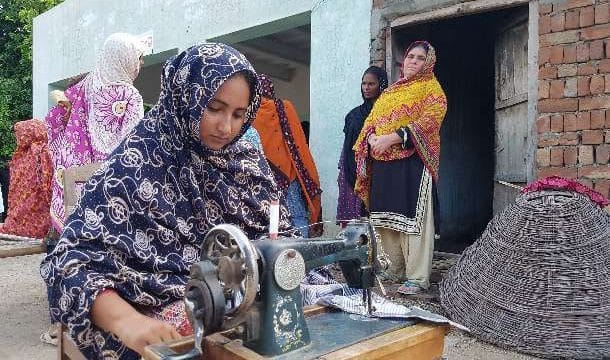
BALKANA (UCAN): In the flood-swamped village of Balkana in Pakistan’s Punjab province, a Caritas building accommodates women and children who have fled their mud houses following heavy rains and flooding.
“We have people from surrounding villages. Most of them met for the first time in the shelter house. Several children have skin allergies and stomach aches due to yellowish drinking water contaminated with sand. Children cry at night due to humidity and no electricity,” Saima Rani said.
Rani has been managing the shelter house, built last year by Caritas Pakistan Multan (CPM), since August 31 when a flash flood triggered by 24 hours of rain damaged crops and houses in villages near the Chenab River.
Members of Caritas disaster management committee (DMC) advised neighbours to protect their documents in plastic bags after authorities warned of flooding in Balkana and other riverside communities.
“The water was everywhere, pouring from the sky and flooding the floor. We stepped out when one of the walls collapsed. Moments later the roof caved in. We had identified the evacuation routes for vulnerable groups. However, almost all mud houses have been damaged,” Rani said.
“We do not allow children to play in water due to snake sightings. The livestock are tied on higher roads leading to the village. We are worried for their fodder as the crops are getting rotten and leaning in standing water,” she said.
Balkana is one of 60 villages in Punjab province flooded by the Chenab River. According to Pakistan’s National Disaster Management Authority, 236 people have died, including 91 children, and 1,303 houses have been damaged in floods caused by heavy rain since June 15.
Located at the entrance to Balkana, the shelter house—a distinctive blue colour—is home to 25 women and children rescued during the disaster. Their salvaged household items lie in a corner. The 5.4 metre by six metre facility, constructed on land owned by a farmer, has a communal toilet, a water tap and two food storage drums.
While male family members spend their time sitting outside on charpoys (wooden beds) under the trees or looking for labour, the women remain busy stitching pillow covers, tablecloths and children’s clothing.
“Our daily errands have increased in the floods. My husband (a farmer) cultivated a sesame crop due to a delay in the annual monsoon season. All our savings have been ruined. A DMC member died of a heart attack after his fish farm was flooded,” Rani said.
Under its disaster risk reduction project, CPM has been supporting these entrepreneurs with wool, knitting needles and a sewing machine since 2018. Six Caritas shelters are operating in villages of Muzaffargarh, one of the worst-affected districts where more than 700,000 people have been displaced by flooding of the Chenab and Indus rivers, and breaches in tributaries and canals.
Caritas Pakistan has been providing ration packages, cooked food and plastic sheets to flood survivors since last month.
More than 700 victims of urban flooding were provided with cooked food in Karachi, where the diocesan office was flooded and the electricity supply was cut off in the seaport city for almost a week.
The country’s prime minister, Imran Khan, announced a package worth 1.1 trillion rupees ($51.15 billion) under the Karachi Transformation Plan to resolve the issues of the biggest city, including provision of clean drinking water, cleaning of drains, and sewage and solid waste disposal.
In the Diocese of Multan, Caritas distributed six life jackets among DMC members of Balkana and other villages on September 4.
“The shelter residents sell a bed sheet set for 5,000 rupees ($230). The food storage boxes stored wheat grains up to 1,600kg. It will help them support their families as the floodwater will take more than a month to subside,” Samuel Clement, executive secretary of CPM, said.
“The survivors complain of the distance to government relief camps. Some refuse to leave their houses despite six feet of water. A DMC member spent two days in a boat with those rescued amid the strong water current. An embankment, built by CPM two months ago, was overtopped by water from the Chenab.”
According to Amjad Gulzar, executive director of Caritas Pakistan, the seven spells of heavy rain were unexpected.
“The flood situation continues getting worse and prevails in the whole country. A lot of work and an extended response are needed to provide relief to the survivors and rehabilitate affected communities,” he said.








